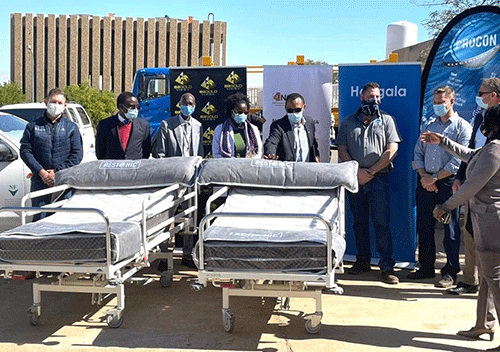When the Namibia Chamber of Commerce and Industry (NCCI), through its Private Sector Covid-19 Response Initiative, handed over the first oxygen tanks at the Katutura State hospital, a sore sight of piled up broken beds piled caught their eyes. Being proactive and in no time at all, the NCCI-led initiative on Monday handed over 100 repaired hospital beds to the health ministry.
“Members of the private sector in this coalition took it upon themselves to assess the extent of the damages of these beds and it occurred to them that these beds were repairable. I single out here, Hangala Construction, B2Gold and Procon who engaged the ministry to assess the situation with broken beds and all the three parties collaborated and undertook to repair all broken beds in our public hospitals throughout the country. Through this collaboration, Hangala Construction with Procon availed their workshops and facilities, and B2Gold and Pupkewitz availed their artisans to assist with the repairs. This morning, we are here once again to deliver on one of our commitments. I would like to deeply thank Hangala Construction, B2Gold, Procon and the Pupkewitz Group for managing quickly
and efficiently,” said NCCI president Bisey Uirab at the handover.
Uirab added that the swift response is the kind of support that shows the national vision of the Namibian businesses community who are willing to live up to their social responsibilities. “It demonstrates true partnership between the private sector and our government in times of hardships. It displays the spirit of cooperation which underpins our joint response to the epidemic. It is our hope that the ministry will equally ensure proper care of this equipment,” Uirab added.
This week will mark a month since the NCCI-Led Private Sector Covid-19 Response Initiative was launched, as a coordinated intervention to support government in the fight against this pandemic.
“We committed ourselves to mobilise private sector funding and resources targeting key emergency needs in our state hospitals and public health facilities as informed and guided by the Ministry of Health and Social Services under the leadership of Comrade Minister Dr Shangula. These critical needs included the supply of medical oxygen, support with facilities to address space shortages to accommodate Covid positive patients as well as supply of other emergency medical equipment,” said UIrab.
Meanwhile, executive chairman of the Hangala Group Leake Hangala said compared to B2Gold and Proton, who deserve the main credit, the group’s involvement in repairing the beds has been modest.
“However, what we believe is worthy of note is the collaborative spirit between and amongst Namibian private companies. The fact that such companies are teaming up and pooling their financial, intellectual and experience is not only commendable but important. They stood up to the call of duty at a moment when all forms of support are critically needed,” said Hangala.
He continued that the ultimate objective is to ensure that Namibia develops a private sector that is financially and technologically strong, good at innovation and employs large numbers of Namibians.
“Calling for this does not mean that we should not encourage foreign direct investment. The two, namely domestic and foreign direct investment are not mutually exclusive and in fact, can be complementary,” said Hangala.
“However, the time has come for Namibia not to anymore be a dumping ground for products at the expense of local capacity.
As every country has done at some point or another, if need be and to guard its industry against unfair competition, Namibia should also employ import restrictions to combat predatory dumping on its market, particularly foodstuffs such as dairy and poultry products. In doing so, we
must of course ensure that Namibian consumers are not disadvantaged in terms of quality, price and security of delivery of those products,” Hangala concluded.


